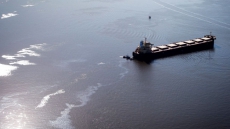CALGARY — It's looking like the Energy East project is going to get more expensive.
TransCanada Corp. (TSX:TRP), the company planning to build the controversial cross-Canada oil pipeline, had been estimating it would cost $12 billion.
But on Friday, it warned that figure is expected to grow.
On a quarterly conference call, CEO Russ Girling said the likely increase is due to adjusting the pipeline's route following feedback from communities, governments and indigenous peoples as well as higher construction costs.
TransCanada did not provide an updated cost estimate or give any clarity on how much the price tag will rise.
Energy East was already going to be one of the costliest infrastructure projects in Canadian history.
For two thirds of the way, TransCanada aims to convert an underused natural gas pipeline and then build all new pipe through Quebec and New Brunswick.
According to TransCanada's quarterly report, the company has already spent $700 million on Energy East — and regulatory hearings have not even started.
Alex Pourbaix, the company's president of development, said considerable work and resources went into the hefty regulatory application filed last October. Ditto consultations with communities along the pipeline's proposed 4,600-kilometre route through six provinces.
TransCanada also had to do a significant amount of integrity work on the existing pipe to assure regulators it can be safely converted to ship oil, he added.
"This project has very, very significant scale and scope and where the regulatory process has gone, in order to make a regulatory filing, a very significant amount of field work, environmental studies, technical studies, engineering reports need to be prepared along with preliminary engineering. All of this is required just to inform the application," said Pourbaix.
"On top of that, there is a real significant obligation — and something that TransCanada would do in any event — to work with stakeholders in the regions."
That includes open houses, one-on-ones with thousands of people and meetings with affected First Nations.
"As you can imagine, all of that work has costs associated with it," said Pourbaix.
The goal of Energy East is to feed Alberta crude to eastern refineries as well as to export it across the Atlantic to lucrative new markets like Europe and India.
TransCanada had initially planned to build two export terminals — one in Cacouna, Que., and one in Saint John, N.B. However, TransCanada scrapped the Cacouna plans in April due to concerns over beluga whale habitat. TransCanada is evaluating whether to find another location in Quebec, or just have one in Saint John.
In announcing the Cacouna decision, TransCanada also pushed back the startup of Energy East by two years to 2020.
Earlier Friday, TransCanada said it earned $429 million or 60 cents per share in the quarter ended June 30, up from $416 million or 59 cents per share a year ago.
Revenue improved to $2.63 billion compared with $2.23 billion a year ago.
Comparable earnings totalled $397 million or 56 cents per share compared with $332 million or 47 per share for the same period last year.


